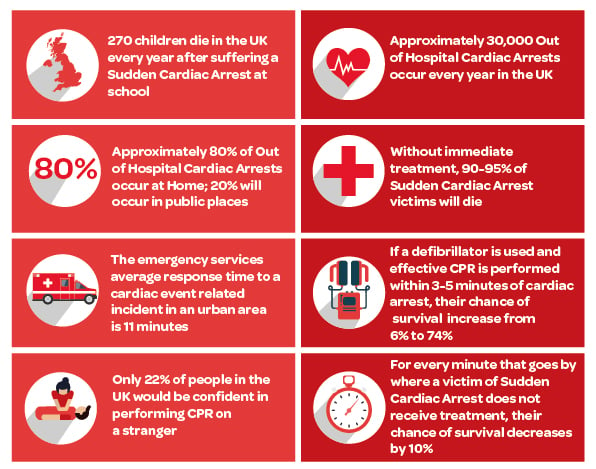Sudden Cardiac Arrest (SCA) is still a leading cause of death. Up to 200 people a day suffer a cardiac arrest in the UK. Covid-19 does not discriminate but neither does Sudden Cardiac Arrest. Although we are currently faced with a global pandemic, let's not forget the key facts about SCA.
Knowing the facts of SCA and the necessary treatment that’s required can be the difference between life and death. Early CPR and defibrillation is required for the best chance of survival.
There are several statistics to represent the risk of Sudden Cardiac Arrest (SCA) and the importance of available defibrillators across the UK to improve the current statistics.

What is Sudden Cardiac Arrest?
It is estimated that there are approximately 60,000 Out of Hospital Cardiac Arrests (OHCA) that happen every year in the UK.
Sudden Cardiac Arrest occurs when a person’s heart goes into a life-threatening rhythm known as ventricular fibrillation (VF) and stops pumping blood around their body and to the brain, causing the person to fall unconscious and stop breathing normally.
Ventricular fibrillation occurs when the electrical activity of the heart becomes so chaotic that the heart stops pumping and quivers or ‘fibrillates’ instead.
Sudden Cardiac Arrest is different from a heart attack. A heart attack occurs when blood flow cannot reach the heart due to a blocked artery.
A poll conducted for the BHF suggests that many people may not recognise a cardiac arrest: 44% said they thought a cardiac arrest and a heart attack were different terms to describe the same condition, and 21% did not know if there was a difference.
A heart attack often leads to a cardiac arrest, but not everyone that has a heart attack will suffer a cardiac arrest. There are several other potential causes leading to cardiac arrest, including other heart problems, severe bleeding, choking or electrocution.
Sudden Cardiac Arrest strikes at any time without warning and sadly, no one is immune regardless of gender, age or fitness level. Sadly, 90-95% of people who suffer from SCA will die.
How common is Sudden Cardiac Arrest?
Every day in the UK, 200 people suffer a Sudden Cardiac Arrest according to a statement from the Resuscitation Council. Only a small percentage of SCA sufferers survive.
Unfortunately, children are not immune from SCA. Every year in the UK, 270 children lose their lives at school as a result of Sudden Cardiac Arrest and each week it claims the lives of 12 people under the age of 35.
To be equipped for the event of a child, teacher or visitor suffering an SCA in a school environment, defibrillators are needed in all schools as well as staff who are trained in their use. Our schools packages ensure learning establishments are equipped with everything they need to save a life.
Defibrillators should be present at every location and, should ultimately be as common as fire extinguishers are, to reduce the number of deaths that occur as a result of SCA.
Out of the 60,000 out-of-hospital cardiac arrests that happen each year in the UK, 80% happen at home and 20% occur in a public place. Just 29% of people would feel confident in responding to a family member if they witnessed a cardiac arrest at home. A lack of quick or effective treatment is a major reason for so few people surviving SCA.
Sudden Cardiac Arrest is a leading cause of death, claiming more lives that lung cancer and breast cancer combined. A quick response and knowing what to do if you are faced with an emergency situation can be the difference between life and death.
How is SCA treated?
Time is precious when responding to an emergency and every second counts when someone is in cardiac arrest.
There are a few simple steps as part of the Chain of Survival that anyone responding to a Sudden Cardiac Arrest can take in the efforts to help save their life:
- Calling 999
- Performing CPR (cardiopulmonary resuscitation)
- Using a PAD (public access defibrillator) if one is available
Recognising that someone is in cardiac arrest and calling 999 is vital to ensure the emergency services arrive to the scene as soon as possible.
Performing CPR keeps the blood flowing to vital organs such as the brain and increases the chance of the heart remaining in a ‘shockable’ rhythm until a defibrillator is used.
A defibrillator should be used to try and shock the heart back into a normal rhythm. Post resuscitation care provided by the emergency medical services and hospital is essential when someone has suffered a cardiac arrest, even if defibrillation appears to have been successful prior to their arrival.
When treatment is delivered within 3-5 minutes of the cardiac arrest taking place, the chance of survival increases from 6% to 74%. The main reason that 90-95% of people who suffer an SCA die is that defibrillation is not carried out quick enough. With no treatment, a person in cardiac arrest will die, usually within minutes. Therefore, when responding to a cardiac emergency, effective and immediate treatment is vital.
For every minute that passes without treatment, the chance of survival decreases by 10%. As it takes 11 minutes, on average for an ambulance to arrive, the person who has suffered a cardiac arrest’s survival chances often depend on help from bystanders.
However, people lack the skills, ability, and confidence to step in and help. In fact, a poll conducted for the BHF found that only 29% of people said they would be confident in performing CPR on a loved one and just 22% of people would feel prepared to deliver CPR to a stranger if it were required. The poll also found that 46% of people would be put off helping someone in cardiac arrest by the fear of causing more harm than good.
Effective CPR, when combined with a shock from a defibrillator is the only definitive treatment for Sudden Cardiac Arrest. Defibrillators are designed to be simple to use for lay responders. Depending on the make and model, voice prompts and visual cues guide the rescuer through the process.
Once the pads have been placed on the patients’ chest, the device analyses the heart rhythm to determine if a shock is required. A shock will only be delivered if required, making it straightforward and safe to use for bystanders of all ages.
By training employees and teaching life-saving lessons in schools, we are enabling a generation of life-savers to provide treatment in an emergency if required.
defibshop are committed to equipping everyone with the skills and knowledge to save a life. Speak to one of our Product Specialists on 0161 776 7422 or fill out our Contact Form.






